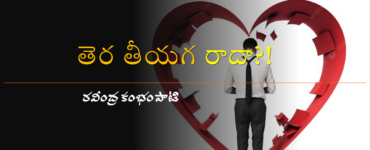Telugu: Devarakonda Balagangadhara Tilak
***
One would find Ramachandra Rao with a smiling face always. It was as if smiling was his second nature, and all irritations and hardships of life keep aloof from him. He greets everybody with a pleasant smile and makes them friends.
Murty feels assured whenever Ramachandra Rao was by him. And feels the invigorating freshness of the morning sun. Of course, Murty had his own problems in oodles. But so long as Ramachandra Rao was around him, they disappear into thin air.
It was always an enigma to Murty why there would never appear a streak of sorrow, or a shade of disgust on Ramachandra Rao’s face? What great secret of life did he possess? What magical formula behind the joy and happiness of this world was his thrall?
For all that, Ramachandra Rao was just a simple and ordinary man. He had neither rank nor property. He was doing some inconsequential job somewhere. It looks like he had no kith and kin. He was all alone. When Murty came to know that the RTC bus coming from Eluru was involved in an accident and Ramachandra Rao was one of the injured passengers, he was worried and immediately rushed to the hospital. He found it hard to identify the victims, for everybody was heavily bandaged around their heads. Ramachandra Rao was not in his senses. There were parents, wives, and children gathered around all the injured patients. Only Ramachandra Rao was waging a lone battle between life and death. Murty was down to tears grieving why misfortune befell such a nice person. Murty sat by his bed in a chair. He expected that once Ramachandra Rao came to his senses, he would hug him and wail his heart out. The very thought brought him to tears and was perplexed how he would console Ramachandra Rao. It took quite a long time before Ramachandra Rao came to his senses. He started moving a muscle here and a limb there. Murty’s heartbeat was up with anxiety. Ramachandra Rao struggled to open his eyes. He looked into the eyes of Murty seriously for a moment. “Oh, Murty! Am I still alive?” he greeted him with a gentle smile. It was as pleasant as the petals of a bud blossom into a pristine white flower.
It gave Murty a jolt. He least expected Ramachandra Rao to keep his smile in such a critical situation. A few days later, Murty took Ramachandra Rao’s hand into his and caressing it he said, “Ramam! It is time you got married. A wife would have served you a lot better under such circumstances. How long can you remain a bachelor?”
A smile was his only reply.
Had Sarala agreed to his proposal, Ramachandra Rao would not have been alone like he was, now. She was his distant relative…a smart and sophisticated girl. There was a strange glow of intellect in her eyes. They were classmates. It was during that time they became friends. Of course, Murty knew that their friendship developed into love. Ramachandra Rao kept no secrets from Murty. He expressed his confidence that she would marry him. Neither did Sarala’s parents raise any objection to the growing friendship between the two. Her parents were rich, and she was their only child. As his faithful friend and well-wisher, Murty strongly wished that Sarala should marry Ramachandra Rao and with that his loneliness and financial problems would come to rest.
The day when Ramachandra Rao got his appointment order, Murty asked him, “Ramam! Did you ever try to elicit her opinion?”
“Let the time come,” was his reply.
After another two or three months, Sarala and Ramachandra Rao met in a park. The quarter moon’s light got strangely melded into the neon lights incident on their bench. Ramachandra Rao mooted the subject and expressed his intention. At that moment, Sarala’s reason prevailed over her heart.
“Ramam! What is your property worth?”
“Just an old, tiled house. That too, in my village.”
“Any farmlands and other assets…?
“Not a cent of land.”
“What is your salary?”
“One hundred and twenty rupees.”
Sarala heaved a heavy sigh. She narrated about her challenges, her necessities, and aspirations in life and about the expectations of her parents. She finally declared that she would not sacrifice her comforts and security, surrendering to weak sentiments like love and liking. “I always like you, but I should also keep my interests in mind. Isn’t it?” she said.
Murty was anxious to know the outcome. No sooner Ramachandra Rao had come out of the park after their meeting, than Murty asked him the same question.
“She rejected,” Ramachandra Rao said coolly in a matter-of-fact way.
Murty got angry with him. Not because of the cool way he answered him, but because he still retained that unruffled smile on his lips. How could Ramachandra Rao remain so lackadaisical at the rejection of love while the rest of the world would either commit suicide or go mad or wail their hearts out and withdraw to the secret recesses of their psyche. What was so special about him? Where did he acquire this poise and stoic resilience? … wondered Murty.
Sarala got married. Not only did Ramachandra Rao attend the marriage, but he also moved closely with both groom’s and bride’s parties for all the four days of the marriage. Addressing Sarala in the end he said, “Your husband is very charming and a nice gentleman. I ardently wish you should be happy always. By next year, you should come here with a baby in your arms.” For that pure, warm, and friendly tone, her eyes moistened. She blushed and said, “Thanks.”
But fate did not bless her the kind of future Ramachandra Rao so ardently wished. Before the turn of the year, she was widowed and returned to her parents. Ramachandra Rao visited her to console. Infused confidence in her. He told many stories to that effect every day. He spared his time for her. Gradually she recovered from her grief.
Once he realized Ramachandra Rao’s necessity was over, Sarala’s father called him aside and said, “It does not look nice if you visit her every day. People may take it in a wrong sense.”
“What you said is true. I will not visit her anymore.” He replied with his customary smile. And he never visited her after that.
Ramachandra Rao rented a three-room tenement. He used one room for the kitchen and cooked his food himself. He completed his ablutions, took his lunch, dressed up in sparkling white dress and got ready by nine o’ clock to go to the office. On the way he would greet Polayya, the Pan shop owner; Raghava Rao, the pleader; Venkayya, the schoolteacher; Govindayya, the curd Vendor; and all and sundry that he came across on the way with an amiable and smiling face. All his colleagues at the office were his friends. The officer also liked him.
But misfortune befell him. He was a victim of the retrenchment drive taken up by his office. Murty was worried for him. For, Ramachandra Rao had no means to live. But Ramachandra Rao held no fears. On the contrary, he comforted Murty in turn and exhorted him.
Two days after losing his job, Ramachandra Rao left for his village. He stayed there for a month, sold the tiled house there, and returned with three thousand rupees. This time he rented a single-room tenement instead of three-bedroom, bought a typewriter, and put up a board “Typing Work is Undertaken Here,” in front of his room.
“How long would the three thousand last? How much could he earn from job- typing work? What about your future?” Murty was concerned.
Ramachandra Rao laughed away his fears, saying, “Murty! Who could give a guarantee for his future? Do you think that all the precautions we take shall insulate us from the ultimate eventualities?” he said.
He came to know that Sarala’s father expired when he was away to his village. He visited her to offer his condolences.
Another six months passed.
Ramachandra Rao fell seriously ill. The fever continued for fifteen days. Murty was alarmed. He went straight to Sarala and apprised her of Ramachandra Rao’s condition.
“You must take up his responsibility. You played with his life and rejected him once. But he never blamed you for that. Money could buy anything but such a good-natured person. Kindly take pity on the person who was at the doorstep of death. Do not hesitate for fear of whatever the world might think of that. The poor man had run down and was fighting the disease all alone in that dungeon. When it comes to situations like this, dictates of the heart should prevail over the pragmatics of wisdom and reason. Don’t you learn this simple truth even now?” Murty pleaded with her. When he lifted his face up, he saw tears streaming down Sarala’s cheeks.
“Let us go.” she said.
They carefully shifted Ramachandra Rao to Sarala’s house. Ramachandra Rao overheard the doctor saying, “No hope,” to Sarala’s enquiries in the adjoining room. He just woke up. Sarala and Murty ran up to him with all concern and fear.
“I heard what the doctor has said. Why should you get so upset about it?” he asked. The smile on his lips lingered as ever. That nonchalant smile… which was unruffled amidst worries, misfortunes and even on the face of death. Despite his distressed state, Murty was at his wit’s end to understand Ramachandra Rao.
But Ramachandra Rao, under Sarala’s constant care and service, and the medical advice of the specialist doctors called for, recovered from his illness. Sarala asked him to stay with her till he completely recovered.
After three months, Ramachandra Rao recovered completely. Expressing his heartful thanks to Sarala for all her help Ramachandra Rao said, “Grant me leave to go to my room. I must start typing work to earn my living.”
“Then, let us go. But how can we two live in that single room?” she expressed her doubts.
Ramachandra Rao was confused. “How could you come and stay with me?” he said unable to make out the import of her words.
Looking at him askance and with a blush she said, “How could a wife live away from her husband?”
It was Ramachandra Rao’s turn to blush. He took her into his embrace.
Sarala married Ramachandra Rao in a simple ceremony. Murty’s happiness had no bounds.
On the first night, combing his hair with her fingers Sarala asked, “Come what may, you always bear that smile on your face. Don’t you tell me about the secret behind that?” she asked.
Shadows of his past chiaroscuroed painfully behind his eyes. He stared into the deep darkness through the window for some time. His voice got sober.
“I was sixteen then. My parents, my sister, my younger brother, and I were travelling to Bhadrachalam. I was weak and frail since birth and my parents always worried about my survival. They believed that I would recover fully with the blessings of Lord Rama of Bhadrachalam and that was the reason for our pilgrimage. At the Papi hills, our boat upturned suddenly. Nobody could find the reason till today. I was washed senseless ashore. By the time I came to my senses, there were people gathered all around me. Close to me lay the bodies of my parents, sister, and brother. They were all dead. Suddenly I became an orphan and destitute. I was overwhelmed with grief and my mind went blank. I wanted to commit suicide plunging back into the same river. But something struck in my mind: This creation, and this life … is all a farce. There is no order or rule behind them. Even if there were, nobody knows their existence. It is beyond our ken. There must be somebody behind the screen who holds the show making us characters. It is a big joke. Buffoonery. A burlesque. Otherwise, how could my people, all so healthy, and teeming with hopes for a wonderful future die; and me, living each day as the last, survive? In this farcical world, Sarala, I am just another character. How foolish of me to worry about the hardships, apprehensions, Sarala? How stupid it is to fill this brief life span with hatred, narrowmindedness, and doubts?”
Sarala was deeply touched. In the brilliance of lights, she could see a film of tear tossing in his eyes.
She hugged him dearly to her heart and said some silly words like, “Ramam! I am not going to leave you no matter what happens.”
Ramachandra Rao smiled … as if a jasmine just blossomed had smiled, and a drop of dew beamed a rainbow under the sun.
Sarala understood … that his smile was not an ordinary smile; that there was unfathomable grief behind that. And there was quintessence of philosophy behind it.
Poor fellow! Murty did not know the secret behind Ramachandra Rao’s smile, to this day!
*
Story Courtesy: Sata Vasantala Telugu Katha. March 2017
Eds: Talluru Nageswara Rao and Hita Sri
Publishers: Visalandhra Publishing House









Add comment